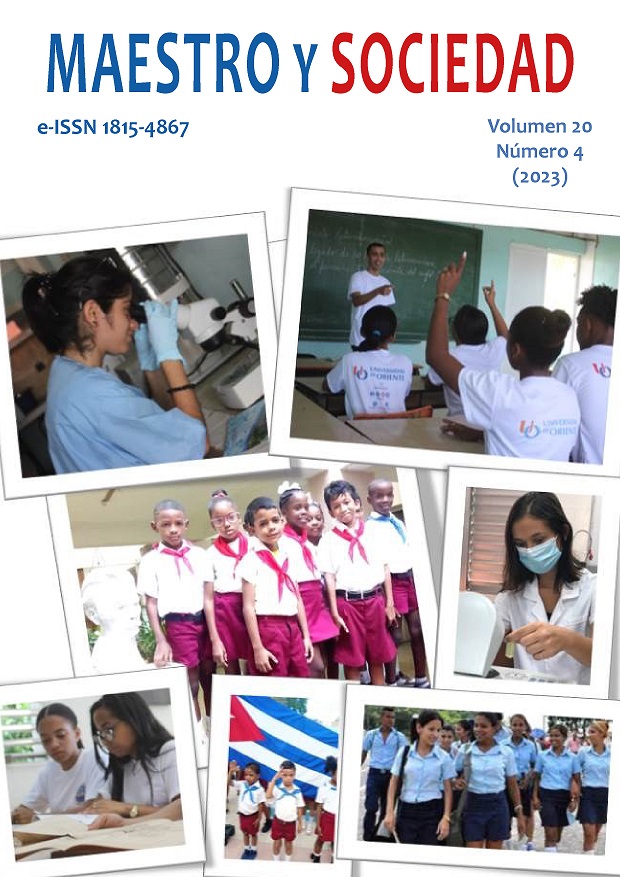The use of technology for the teaching-learning of Mathematics in students of educational units
Keywords:
Learning, Education, Knowledge, Mathematics, TechnologyAbstract
The use of technology in the teaching-learning process through Information and Communication Technologies as tools for the educational process causes great changes and transformations in teachers and students at different levels of training. The present research work aims to analyze the incidence of ICT in the teaching-learning of mathematics in students of educational units, in the Quevedo Canton, Los Ríos Province in Ecuador. The research is framed in a qualitative-quantitative approach, through exploratory and descriptive, using the survey technique as a questionnaire as a data collection instrument, which allows collecting fundamental information, high school students and mathematics teachers from the educational units were taken as the reference population. The application of ICT in student learning has notably favored the existence of more significant learning, in addition to the fact that there has been a predisposition on the part of teachers to innovate in this area, through the use of technological resources, whose applications They have allowed students to assimilate new learning in a dynamic, novel and understandable way with satisfactory results.
References
Arias, P., Merino, M., & Peralvo, C. (2017). Análisis de la Teoría de Psico-genética de Jean Piaget: Un aporte a la discusión. Revista Científica Dominio de Las Ciencias, 3, 833–845. https://doi.org/10.23857/dc.v3i3.508
Bismarck, A., & Arana, M. (2017). Utilización de las TIC en el proceso de enseñanza - aprendizaje , una aproximación desde la comunicación Use of ICT in the teaching - learning process , an approach from communication. INNOVA Research Journal, 2(8), 294–306. file:///C:/Users/Usuario/Downloads/380-Texto del artículo-1267-3-10-20190522.pdf
Castillo-Retamal, F. (2021). Formación docente en TIC y su evidencia en tiempos de COVID-19. Revista Saberes Educativos, 6, 144. https://doi.org/10.5354/2452-5014.2021.60715
Castro Rodríguez, A. S., & Loor Cobeña, J. M. (2021). Aplicación de metodologías activas en el uso de las TIC en el proceso de enseñanza y aprendizaje de los docentes Bachillerato.
Chancusig, J., Flores, G., & Constante, M. (2017). Las TIC en la formación docente. Revista Boletín Redipe, 6(2), 174–198. https://bit.ly/3rwLsu3
Chonata Guilla, I. N. (2018). PROGRAMA DE CAPACITACIÓN EN LAS TICs PARA DOCENTES DE LA UNIDAD EDUCATIVA PCEI PATATE.
Fabre Cavanna, J. E., Barrios Palacios, Y. D., Rojas Vera, R. A., Zambrano Miranda, D., & Guerrero Ávila, Z. E. (2021). Conocimiento y frecuencia de uso de las TIC en docentes de la Educación Superior (Tecnocient). Editorial Tecnocientífica Americana. https://doi.org/10.51736/ETA2021TU6
Fernández, A. M., Reyes, M. J., & López, M. I. V. (2022). Tecnologías de la información y comunicación (TIC) en formación y docencia. FMC - Formación Médica Continuada En Atención Primaria, 29(3), 28–38. https://doi.org/10.1016/j.fmc.2022.03.004
Garcés, L., Montaluisa, Á., & Salas, E. (2018). El aprendizaje significativo y su relación con los estilos de aprendizaje. Revista Anales, 1(376), 231–248.
Garcilazo Jaimes, H. L. (2020). Uso de herramientas Tic y desempeño docente en Instituciones Educativas de nivel secundaria de la Región Ancash. 1–106. https://repositorio.unh.edu.pe/bitstream/handle/UNH/3665/TESIS-SEGESP-FED-2020-GARCILAZO JAIMES.pdf?sequence=1&isAllowed=y
Guerra García, J. (2020). El constructivismo en la educación y el aporte de la teoría sociocultural de Vygotsky para comprender la construcción del conocimiento en el ser humano. Dilemas Contemporáneos: Educación, Política y Valores, 21(1), 1–9. https://doi.org/10.46377/dilemas.v32i1.2033
Hernandez, R. M. (2017). Impacto de las TIC en la educación: Retos y Perspectivas. Propósitos y Representaciones, 5(1), 325. https://doi.org/10.20511/pyr2017.v5n1.149
Hernández, R. M., Orrego Cumpa, R., & Quiñones Rodríguez, S. (2018). Nuevas formas de aprender: La formación docente frente al uso de las TIC. Propósitos y Representaciones, 6(2), 671. https://doi.org/10.20511/pyr2018.v6n2.248
Luna-Romero, Á. E., Vega, F. Y., & Carvajal, H. R. (2018). Formación docente en el uso de las TIC. Universidad, Ciencia y Tecnología, 02(2), 46–52. https://uctunexpo.autanabooks.com/index.php/uct/article/view/66
Ministerio de Educación (2016),Ecuador: Poloticas del sistema Educativo.
Mintel-Ecuador. (2019). Ecuador Digital: Sinergia entre educación y tecnología. https://www.telecomunicaciones. gob.ec/ecuador-digital-sinergia-entre-educacion-y-tecnologia/
Mirete Ruiz, A. B. (2010). Formación Docente En Tics. ¿Están Los Docentes Preparados Para La REvolución Tic? International Journal of Developmental and Educational Psychology, 4(1), 35–44. https://www.redalyc.org/pdf/3498/349832327003.pdf
Morales Pacavita, O. S., & Leguizamón González, M. C. (2018). Teoría andragógica: aciertos y desaciertos en la formación docente en TIC. Praxis & Saber, 9(19), 161–181. https://doi.org/10.19053/22160159.v9.n19.2018.7926
Ramos-Galarza, C. A. (2020). Alcances de una investigación. CienciAmérica, 9(3), 1–6. https://doi.org/10.33210/ca.v9i3.336
Rodríguez, A., & Pérez, A. O. (2017). Métodos científicos de indagación y de construcción del conocimiento. Revista Escuela de Administración de Negocios, 82, 1–26. https://www.redalyc.org/pdf/206/20652069006.pdf
Vergara, O., Stayner, M., & Investigación, M. Y. T. D. E. (2017). Métodos y técnicas de investigación.
Zambrano, Q. y. (2021). Las TIC’s como teoría y herramienta transversal en la educación. Perspectivas y realidades. Polo Del Conocimiento, 6(1), 1156–1186.
Zuñiga, L., & Hurtado, R. (2019). Capacitación docente como estrategia para la incorporación de TIC en los procesos de enseñanza del Centro Educativo El Zarzal. Journal of Chemical Information and Modeling, 53(9), 1689–1699.
Published
How to Cite
Issue
Section
License
Copyright (c) 2023 Jaime Amado Rosero Rojas, Cristian Paul Topa Chuquitarco, Pedro Alexander Mestanza Segura, Leydi Verónica Ruiz Loor

This work is licensed under a Creative Commons Attribution-NonCommercial-NoDerivatives 4.0 International License.
This journal provides immediate open access to its content, based on the principle that offering the public free access to research helps a greater global exchange of knowledge. Each author is responsible for the content of each of their articles.



























 Universidad de Oriente
Universidad de Oriente 